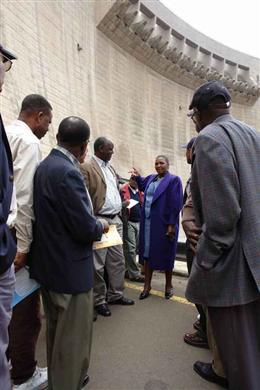The 1997 UN Convention on the Law of the Non-Navigational Uses of International Watercourses (UN Convention) provides a framework and principles to guide basin-level agreements. The UN Convention has not been ratified in all of the Orange-Senqu River basin countries and it is not binding, rather it is designed to provide general guidelines as an umbrella accord, to allow countries to form basin-specific agreements. At the basin level, riparian countries have been working to form agreements to govern the development and use of shared waterways. In fact, from 1980 to 2000, over 62 agreements were signed concerning 36 different basins (Conca et al. 2006).
The "Agreement for the Establishment of the Orange-Senqu River Commission", signed in 2000 by Botswana, Lesotho, Namibia and South Africa, is an example of a basin level agreement. The Orange-Senqu River Commission (ORASECOM) is the first commission to be established following the regional ratification of the Revised Protocol on Shared Watercourses in the Southern African Development Community (Revised Protocol).

The ORASECOM and the Nile Basin Initiative study tour visiting Katse Dam, Lesotho.
Source:ORASECOM 2009
( click to enlarge )
The Agreement refers to, and recognises the following agreements:
-
Helsinki Rules (1966)
-
UN Convention of the Non-Navigational Uses of International Watercourses (UN Convention; 1997)
-
The Revised Protocol on Shared Watercourses in the Southern African Development Community (Revised Protocol; 2003)
ORASECOM is the first multinational, multi-lateral institution dealing with the management of the Orange-Senqu transboundary water system. It was also the first basin commission to be formed with reference to the Protocol on Shared Watercourse Systems (Böge 2006).
The Commission’s aim is to develop and manage the Orange-Senqu River for the benefit of all the riparian states. It provides a forum for overall consultation and coordination between the watercourse states for sound integrated water resources management and development basin. It is expected to strengthen regional solidarity, contribute to peace and harmony, and enhance socio-economic cooperation.
The Commission has the legal status of a private institution and the ORASECOM Agreement provides that it has international status and international legal personality. A copy of the ORASECOM Agreement is provided in the Document Library.
